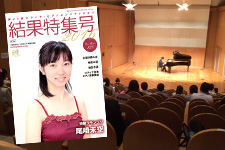What is the Trend of Each Age Group? An Analysis on the Competition 2016
2016/10/19 | コメント(0)
| トラックバック(0)
|
 The comprehensive data booklet of the 2016 PTNA Piano Competition was issued recently. This year, the total number of paritipants sets a record high. We would like to analyze trends in some of the age groups.
The comprehensive data booklet of the 2016 PTNA Piano Competition was issued recently. This year, the total number of paritipants sets a record high. We would like to analyze trends in some of the age groups. First of all, in the youngest age group (up to 6, the grade A2), the number of participants in solo and duo divisions were both increased. Especially the latter has increased by 16% as compared to the last year. To some extent, it is due to the inauguration of the pre-elementary grade last year. It seems that young children likely to enjoy playing with someone, either their siblings or friends, which makes them feel easier to take first step to the competition. One of the teachers, Kaori Okawa, noticed that children listened to and inspired each other regardless of their age difference.
It is a noteworthy trend that the age group of 10 has been increasing steadily in the past few years. At this age, children likely to start going to another after-school activities like cram schools, and becomes difficult to make good balance between study and piano. Nevertheless, they keep playing piano and taking on a challenge to the competition. On the other hand, the number of the age group of 11-12 has been decreased slightly in solo division, but increased equally in duo division. Since the duo division requires one piece at each stage (preliminary and regional final round), it seems easier to find time to practice for the competition during those busy academic year.
The age group of 15 as remarkably increased, due to the introduction of J category in Grandmuse division (for amateurs). One of the participants, Haruhi Niioka (3rd grade at junior high school) won a prize of excellence at the regional final round. She has been taking part in the solo division in the past years, in which one must prepare 4 required pieces, but this year, she preferred to choose her own favorite pieces (No required repertoires for J category). As she was in the midst of intensive preparatory period for entry examinations, this decision allowed her to spend time for piano and study appropriately. Her teacher, Tatsuko Fukui, understood that the participation of J category would bring her further efforts, refined self-expression, and maturity as a human, in this busy schedule.
【GoogleAdsense】